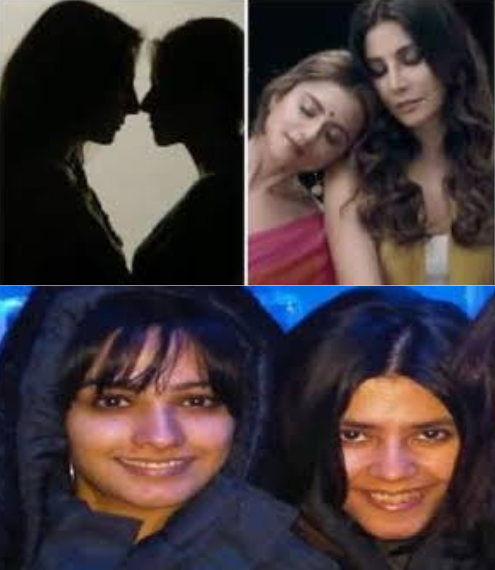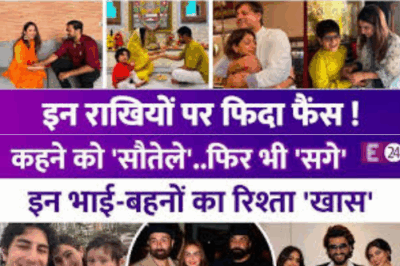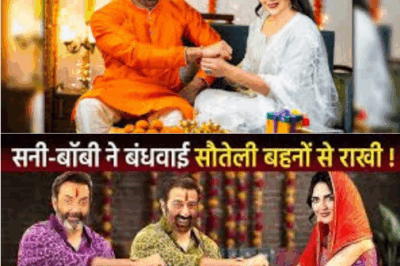Ekta Kapoor’s Dating Rumours,Lesbian Tag & Shocking Truth| Explained
Ekta Kapoor’s journey is nothing short of extraordinary. Born into the glittering world of Bollywood as the daughter of legendary actor Jeetendra, she was never a stranger to fame. But rather than riding solely on the coattails of her father’s success, Ekta Kapoor chose to carve out her own path—one filled with failures, reinvention, resilience, and ultimately, unmatched success. From being mocked for her initial missteps to becoming the undisputed “Queen of Indian Television,” Ekta’s story is a blueprint for anyone striving to turn adversity into opportunity.
Raised in the elite circles of Mumbai, Ekta attended Bombay Scottish School and later pursued graduation at Mithibai College. Unlike most aspiring media moguls, she had no clear direction during her early years. Partying with friends and living the privileged life of a star kid, Ekta had no immediate ambitions. However, that all changed with pressure from her family—particularly her father Jeetendra, who reminded her of his own hard-earned success. In response, Ekta half-heartedly joined an advertising agency, not out of passion but just to show her family she was doing “something.”
Things took a turn when Jeetendra received an offer from a London-based TV channel called TV Asia to produce content. Wanting to explore a new business opportunity, Jeetendra started a production company with a partner and handed over the reins of content creation to Ekta. With American television serials as her inspiration and a guaranteed platform in hand, she confidently developed five to six pilot episodes. However, fate had other plans—the TV channel never launched. With the project shelved, the pilots were scrapped, and Jeetendra’s business partnership dissolved. Ekta had inadvertently sunk a significant amount of her father’s money, leading to industry-wide criticism and whispers about her capabilities.
This was a turning point. The financial loss was less devastating for Ekta than the emotional toll of disappointing her father. Determined to make amends, she invested what little she had—around ₹50,000—into a pilot episode for a new show titled Hum Paanch. Operating out of the basement of their Juhu bungalow, she pitched the show to Zee TV. To her surprise, the network loved it. The sitcom became a massive hit, marking the beginning of Ekta Kapoor’s reign in Indian television.

Hum Paanch not only recouped her previous losses but also gave the industry a new face—Vidya Balan. From there, Ekta experimented in the southern market. Facing resistance from the South Indian industry, she turned to none other than superstar Rajinikanth for support. With his help, she secured a meeting with Sun TV, which led to the creation of the Tamil serial Kutumbam. This was later adapted into Hindi as Ghar Ek Mandir, further cementing her growing influence.
In 1997, however, another major setback tested her resolve. She invested ₹1 crore into a new serial, only to be offered far lower rates by channels than she had anticipated. Financial losses began piling up—up to ₹2 lakh a day. Desperate, she turned to her mother, Shobha Kapoor, who advised her to hold on just a little longer. That patience paid off. Within months, the serial’s value increased, and she secured a deal that not only covered her losses but marked a triumphant return. The serial, Itihaas, was a game-changer.
This success led to the birth of her signature strategy—titling her shows with the letter “K.” With serials like Kanyadaan, Kundali, Koshish Ek Asha, and Kahiin Kissi Roz, she began to create a brand identity. But it was in 2000 that she made history with a show that changed Indian television forever—Kyunki Saas Bhi Kabhi Bahu Thi. The show captured the imagination of millions, transforming housewives into devoted viewers and altering the dynamics of family viewing habits. The lead actress, Smriti Irani, became a household name and later entered politics, serving as a Union Minister. Actor Ronit Roy, who was struggling and working as a bodyguard for Bollywood stars at the time, was given a second chance by Ekta and was cast in a pivotal role, reviving his career. Ronit still credits her for his resurgence.
At the same time, Kahaani Ghar Ghar Ki launched, further solidifying Ekta’s empire. Both shows dominated TRPs for years and established her as an industry titan. These long-running daily soaps not only set new records but also showcased her ability to connect with Indian audiences on a deeply emotional level. However, her strong partnership with Star Plus eventually ended, prompting Ekta to diversify her collaborations and explore other channels. Her content had become so influential that other networks welcomed her with open arms.

Realizing the limitations of television, Ekta turned her attention to films. Though she had earlier co-produced projects like Kucch To Hai, Krishna Cottage, and Shootout at Lokhandwala, it wasn’t until 2010 that she truly shook up Bollywood. With Love Sex Aur Dhokha, she proved her mettle as a risk-taker. Critics and industry veterans scoffed at the boldness of the subject, but the film was both critically and commercially successful. The same year saw the release of Once Upon a Time in Mumbaai, which further validated her cinematic vision.
Not content with just television and films, Ekta ventured into digital platforms with ALTBalaji. Her web series became synonymous with edgy, bold content that challenged conventional norms. However, her entry into OTT wasn’t without controversy. In 2018, Ekta introduced a “nudity clause” for actors working in her bold series. The clause ensured that actors committed to intimate scenes upfront, preventing later refusals. This unprecedented move attracted sharp criticism, but Ekta defended it as necessary for creative integrity.
Controversies have always followed her, whether it’s for her bold clothing choices, her superstitions involving gemstones and numerology, or her confrontations with actors. Many stars who got their big break through Ekta eventually fell out with her. Smriti Irani, Rajeev Khandelwal, Ronit Roy, and Pulkit Samrat are just a few who parted ways after disputes. Some even dragged her to court. Despite these challenges, Ekta’s impact remains undeniable.
In her personal life, Ekta Kapoor has chosen an unconventional path. Despite being one of the most powerful women in Indian entertainment, she has never married. Rumors linking her with filmmaker Karan Johar gained momentum due to their similarities—both single, successful, and private about their relationships—but nothing ever materialized. In 2019, Ekta became a mother through surrogacy, naming her son Ravie Kapoor. Her brother, Tusshar Kapoor, had already taken a similar step in 2016 with the birth of his son, Laksshya. Their choice to embrace single parenthood without marriage sent a strong message about redefining modern family structures.

Ekta’s friendships have also made headlines. Her close bond with actress Anita Hassanandani is well-known, often displayed in parties and vacations. Her ties with Mouni Roy and Prachee Desai were similarly strong. Perhaps the most talked-about rumor was her alleged relationship with actress Riddhi Dogra, with social media posts and vacations together fueling speculation. Neither Ekta nor Riddhi ever confirmed anything, but the gossip columns were relentless. These rumors even led to assumptions about Ekta’s sexuality, with some labeling her as lesbian without any concrete evidence.
Despite all the noise—be it failures, controversies, or gossip—Ekta Kapoor has remained focused on what she does best: creating content that resonates with millions. From shaping careers to reshaping how Indian families consume entertainment, her legacy is unparalleled. Her career is a mix of ambition, controversy, bold decisions, and undeniable influence.
Today, Ekta continues to dominate Indian television while actively producing films and web series. She balances traditional values with modern narratives and isn’t afraid to experiment. Whether it’s nurturing new talent or challenging societal norms, Ekta Kapoor is a force who refuses to slow down.
Her story is not just about success—it’s about reinvention, resilience, and rewriting the rules. As she once said, failure doesn’t scare her. It’s not the fall but the refusal to rise that defines defeat. And Ekta Kapoor? She has never stopped rising.
Play video :
News
Kapil Sharma Attaacked & Admit to Hospital after 25 Gunshots😱 and Life-Threatening Incident!
Kapil Sharma Attaacked & Admit to Hospital after 25 Gunshots😱 and Life-Threatening Incident! Kapil Sharma, the renowned Indian comedian and…
Amitabh Bachchan Granddaughter Navya Naveli Reaction On Amitabh Marriage With Rekha In Hospital
Amitabh Bachchan Granddaughter Navya Naveli Reaction On Amitabh Marriage With Rekha In Hospital A wave of emotion spread through Bollywood…
Bollywood siblings immersed themselves in the celebration of Raksha Bandhan, shared beautiful pictures, fans were delighted
Bollywood siblings immersed themselves in the celebration of Raksha Bandhan, shared beautiful pictures, fans were delighted Raksha Bandhan, the beloved…
Sunny Deol Raksha Bandhan With Esha Deol, Bobby Deol, Dharmendra Border 2 Trailer, Rakhi Special
Sunny Deol Raksha Bandhan With Esha Deol, Bobby Deol, Dharmendra Border 2 Trailer, Rakhi Special Raksha Bandhan, the Indian festival…
Kapil Sharma Attaacked & Admit to Hospital after 25 Gunshots😱 and Life-Threatening Incident!
Kapil Sharma Attaacked & Admit to Hospital after 25 Gunshots😱 and Life-Threatening Incident! . . . Kapil Sharma Hospitalized After…
Sad news for Kapil Sharma Fans as Kapil sharma Attaackd & Admit to Hospital in Serious condtion 😱
Sad news for Kapil Sharma Fans as Kapil sharma Attaackd & Admit to Hospital in Serious condtion 😱 . ….
End of content
No more pages to load








